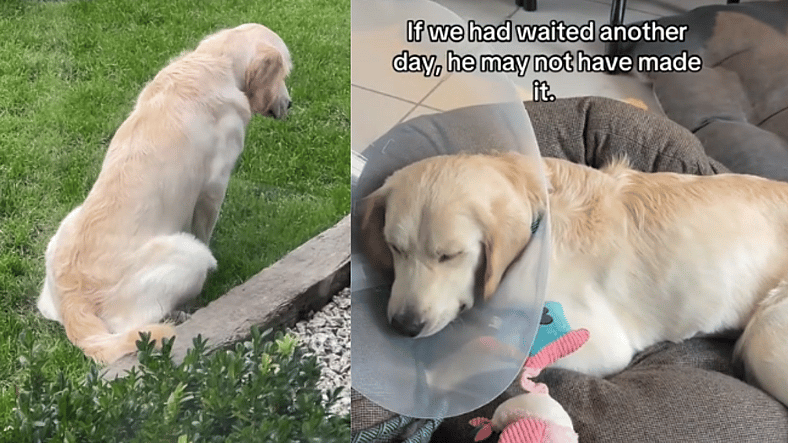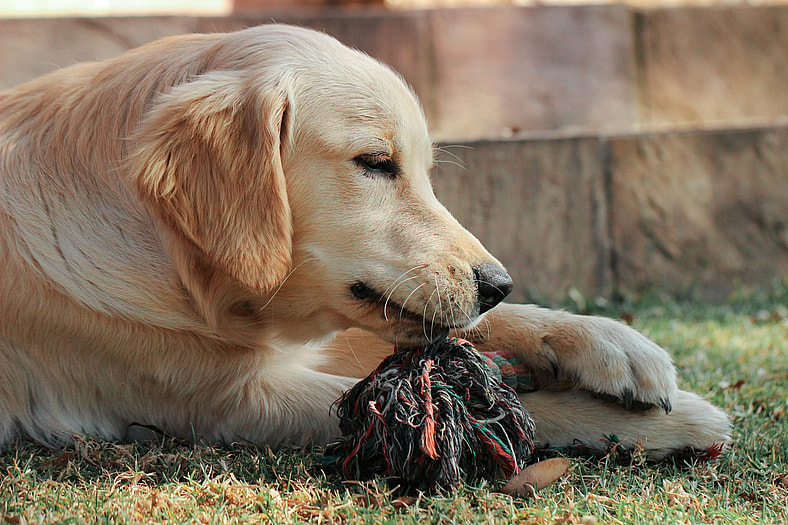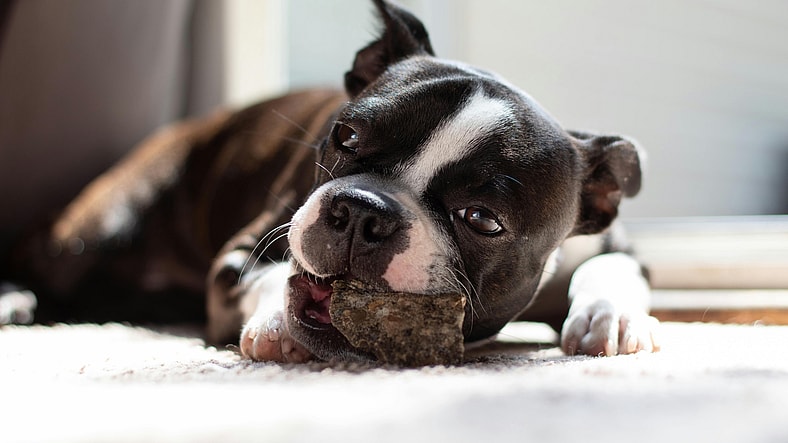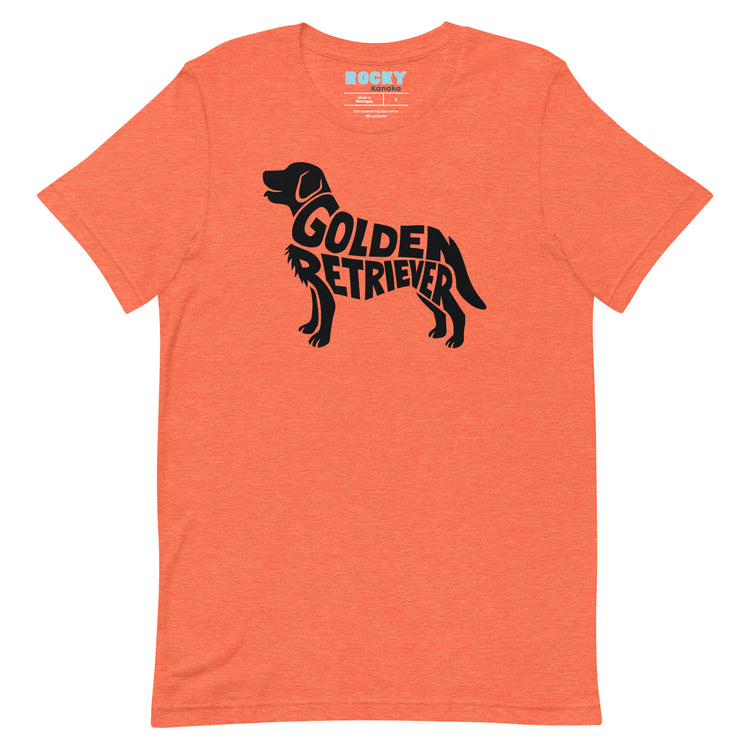Vet’s Missed Diagnosis Nearly Cost This Golden Retriever His Life —but a 2nd Opinion Saves the Day
One of the scariest things about being a dog owner is watching your furry friend go from healthy to seriously ill. It’s even worse if the vet is unable to pinpoint exactly what’s ailing your dog, and their condition continues to deteriorate with every passing day.
No one relates to this more than one Golden Retriever owner on TikTok, who recently narrated her dog’s near-death experience with intestinal obstruction. (Watch video below)

According to the owner, her ever-bubbly dog, Bobbi, suddenly became ill one morning to the point that he’d refuse to eat his favorite meal, chicken & rice. When she sought veterinary attention, the vet concluded that Bobbi could be suffering from a bacterial or viral infection of the stomach. Unfortunately, this diagnosis wasn’t accurate as Bobbi worsened just hours later. This prompted her to see a different vet.
“Overnight he became severely unwell, unable to stand, and vomiting six times…..we rushed him to the vets’ first thing in the morning and they immediately felt a stomach obstruction. It felt like a hard lump in his intestine,” reads part of the lengthy text layered over the video.
As revealed in the short clip, the second vet visit uncovered the root cause of Bobbi’s deteriorating health: he had a corn cob lodged in his intestines, causing an obstruction. Thankfully, Bobbi underwent surgery and has since recovered.
“If we hadn’t gotten a second opinion, Bobbi probably wouldn’t have survived another night,” her owner wrote.
Watch the video below:
@dittawiggles Always trust your gut, has anyone else experienced anything like this with their dogs? @Bobbi Wiggles #fyp #foryoupage #foryou #dogsoftiktok #rescue #dogsontiktok #dogtok #pets #trending #viral #doglovers #doglove #adoption #adoptionjourney #dogs #cute #sad #stomach #obstruction #food #cornoncob #corn ♬ Stories 2 – Danilo Stankovic
Intestinal Obstruction in Dogs: Here’s Everything You Need to Know
Also referred to as intestinal blockage, intestinal obstruction in dogs is a potentially fatal condition where a dog’s intestines (or stomach) become partially or completely blocked. The most common cause of intestinal obstruction in dogs is the ingestion of foreign objects.
Our furry friends, as we all know, are curious creatures who enjoy exploring things using their mouths. This puts them at risk of swallowing all manner of indigestible items, from rubber toys to socks, holiday decorations, string yarns, and robe fibers …..the list is endless.
In other cases, partial or complete intestinal blockage may be caused by medical conditions such as intestinal tumors.
Intestinal blockage causes different potential complications. It hinders food or liquid from passing through your dog’s intestines for digestion, interferes with proper blood flow to their gastrointestinal tract (ultimately causing intestinal tissue death), and may perforate their intestinal wall as the foreign object presses against the wall (this can cause sepsis blood poisoning as contents of the intestines leak into the surrounding organs).
“Intestinal blockages are one of the most common pet emergencies I see. It’s serious, expensive, and gets more risky each time they need more intervention,” explains veterinarian Dr. Skylar Duck of Dr. Duck Pet Doctor.
Left untreated, intestinal blockage can result in death within 3-4 days.
8 Telltale Signs of Intestinal Obstruction in Dogs
When your dog has an intestinal blockage, the symptoms they present may mimic those of an ordinary upset stomach. It’s therefore important to call your veterinarian as soon as you notice any symptom, especially if you didn’t actually see them ingesting something unusual.
Among the common signs of intestinal obstruction in dogs include:
- Persistent gagging or vomiting
- General body weakness/lethargy
- Loss of appetite
- Straining during defecation
- Aggressive behavior when the abdomen is touched
- Restlessness
- Hunching or whining (due to abdominal pain)
- Visible bloating
Keep in mind that these symptoms may vary from dog to dog. For some dogs, the signs may not be that obvious.
“My dog ate a kitchen towel a few years ago. She is incredibly stoic so even though she had to have been in intense pain, she did not show it. She did start to vomit often and stopped eating. She is incredibly food-motivated, so that was the thing that sent us to the vet. Because she seemed fine otherwise she was sent home on anti-nausea meds and a rehydration injection. After 24 more hours, I took her back because she wasn’t improving and she still didn’t react to the vet pressing on her belly. They did a barium test, found the blockage, and did emergency surgery. They said she would have been dead in 24 hours,” narrated user @salty-lemons in a Reddit discussion post on intestinal blockage in dogs.
Diagnosis & Treatment of Intestinal Blockage in Dogs
Usually, the diagnosis of intestinal obstruction involves a physical exam and diagnostics tests such as an ultrasound or x-ray. These diagnostic tests help determine the size, shape, and location of the foreign object. Comprehensive bloodwork may also be carried out to establish the extent of damage caused by the obstruction on your dog’s overall health.
When it comes to treating intestinal obstruction, the vet could either take a surgical or non-surgical treatment approach. This decision is informed by crucial factors such as:
- How long the foreign object has remained lodged in your dog’s intestines
- The location of the obstruction
- The size of the foreign object
Surgery is usually carried out once the vet establishes that the foreign object poses an immediate danger to your dog’s life. Generally, dog intestinal blockage surgery ranges anywhere from $2,000 to $ 8,000. This cost, however, could go higher depending on factors like the severity of the obstruction.
“My puppy had a $2,000 surgery two weeks ago to remove a sock. May need another surgery to remove another intestinal blockage (likely a sock or a towel). Could cost up to $8,000 this time at the emergency vet,” shared user @Painted_Up in a Reddit discussion on intestinal obstruction in dogs surgery cost.
Intestinal Obstruction in Dogs Survival Rate
After surgery, your dog will remain hospitalized to ensure that any post-surgery complications are caught promptly. The first 72 hours after surgery are the most critical, so close monitoring during this time is necessary.
In general, dogs whose obstruction is detected early and treated sooner rather than later have a higher survival rate than those whose obstruction isn’t addressed in an early manner.
“Early detection is key. So if your dog is showing any signs, don’t wait — contact your vet immediately,” advises Dr. Tomas Infernuso, a veterinarian at Animal Surgical Center.
Intestinal Obstruction in Dogs FAQs
Can you feel an intestinal obstruction in a dog?
Yes, in some cases of intestinal obstruction, a dog’s abdomen may feel hard to the touch.
How long does an intestinal obstruction last in dogs?
As noted earlier, death can occur within 3-4 days if the intestinal blockage is left untreated.







